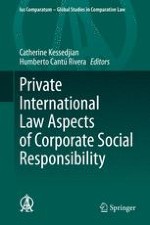2020 | OriginalPaper | Chapter
China
Authors : Guangjian Tu, Si Chen
Published in: Private International Law Aspects of Corporate Social Responsibility
Publisher: Springer International Publishing
Activate our intelligent search to find suitable subject content or patents.
Select sections of text to find matching patents with Artificial Intelligence. powered by
Select sections of text to find additional relevant content using AI-assisted search. powered by
